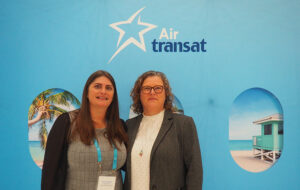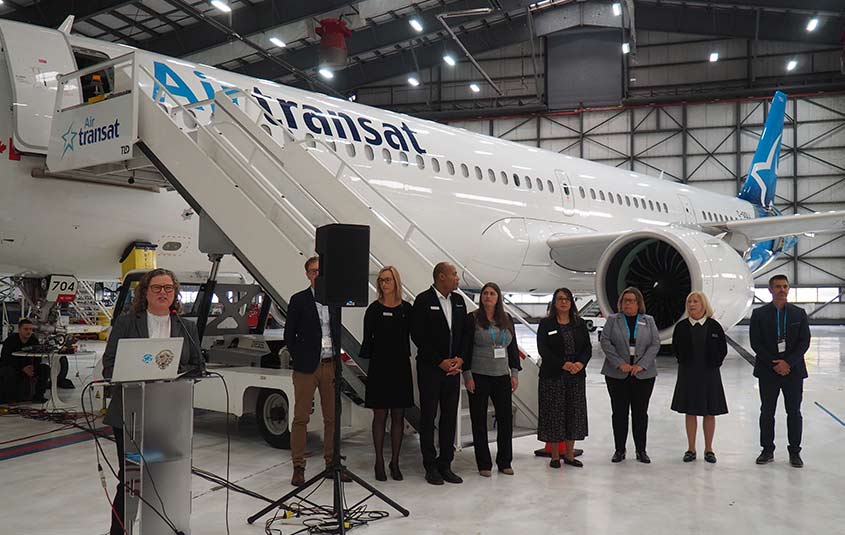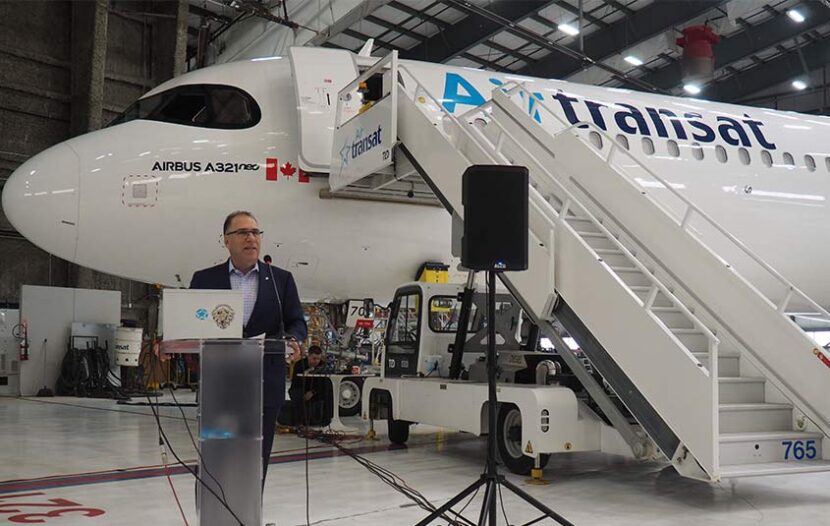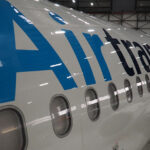MISSISSAUGA — Transat rolled out the red carpet for VIP guests and its partners yesterday to celebrate the launch of its 2022-2023 winter program and its new Airbus A321neoLR aircraft.
Taking place at its hangar in Mississauga on Oct. 19, the VIP event included early morning mimosas, breakfast hors d’oeuvres and tours of the aircraft, which Transat first introduced in summer 2019 but, due to the global pandemic, was unable to celebrate as planned with a big reveal in spring 2020.
“It’s not every day that we have an A321neo Long Range sitting in the hangar so we thought we’d take advantage of it being here and plan an event around it,” Nicole Bursey, Transat’s Commercial Director told Travelweek. “This type of aircraft is the future for Transat. We feel that it’s the right size aircraft for our market, it’s got great range capabilities and it’s a very green aircraft so it goes along with our sustainability initiatives.”
The Airbus A321neoLR is the culmination of Air Transat’s massive fleet transformation, which included the retirement of its A310s and a few older A330s. The airline currently has 12 A321LRs, with an additional five to come, making its current fleet on average 40% younger than it was prior to the pandemic.

Transat’s Lindsay Merrill (left) and Nicole Bursey
Showing it off yesterday, said Bursey, came perfectly timed with Air Transat’s new bilateral codeshare with Porter Airlines, which launched earlier this week.
“We want to increase the footprint of Transat but we don’t necessarily have all the aircraft to do it. So we’re looking for great partnerships, like our codeshare with Porter and our partnership with WestJet, which we introduced last year. We’re really looking for strategic growth in a very methodical way. It’s not necessarily about adding new destinations for Air Transat but rather building out our network,” she added.
The new codeshares will certainly help position Transat for a good winter season, with a program that includes 26 destinations and over 300 hotels in the Caribbean, Mexico’s Pacific Coast, the Antilles, Latin America and Florida, plus the resumption of direct flights to Havana from Montreal. And with the removal of Canada’s final COVID-19 border measures on Oct. 1, winter sales, said Bursey, are looking good.
“It’s still a little bit ‘close in’ than pre-COVID, meaning people aren’t necessarily planning six months out. But I think this is an optimistic thing for travel agents, that they have the opportunity to still sell now for travel in November and December. Christmas is quickly filling up but there’s still some space available,” she added.
Bursey also noted that following the removal of border measures, family bookings and groups have seen an immediate uptick.
Removing the measures is making families, particularly those with younger children, more comfortable with travelling,” she said. “Plus, prior to Covid, gathering 30 people to go on a group wasn’t necessary that difficult. But after Covid, people had different statuses and different levels of concern. Now, as things have opened up, we’re getting back to those larger groups.”
“We’re still here, we’re still standing”
Though it’s been two and a half years since the start of the global pandemic, Transat has been experiencing uncertainties for much longer – three and a half years to be exact, said Joe Adamo, Chief Sales & Marketing Officer. Recalling the airline’s attempted merger with Air Canada, which was first announced in May 2019 and later fell through in April 2021 after it failed to get approval from the European Commission, Adamo said the non-deal “unleashed a sense of questioning” about what the future would hold for the airline.
“But I’m here to tell you that we’re still here, we’re still standing and the most important thing is we got through it,” he said.

The Transat team in front of the Airbus A321neoLR aircraft
Though Transat has endured, Adamo also noted that it is a “very different company” now than it was before the pandemic. The team currently sits at 4,300 strong, down from 5,000, with Adamo adding that numbers won’t likely return to pre-pandemic levels.
From a financial point of view, the airline is certainly in a different position now than prior to the pandemic, when it had “an excess of half a billion dollars with exactly zero debt,” said Adamo. Where did all that money go? Towards getting through the crisis.
“We’re burning through an awful lot of money but have shorn up our liquidity with loans – and they are loans, not gifts. We’re grateful for what we got, but these are interest-bearing loans, and they do make for a very different company,” he added.
This past July, Transat secured $100 million in liquidity from the Canada Enterprise Emergency Funding Corporation (CEEFC), on top of its initial Large Employer Emergency Financing Facility (LEEFF) loan back in April 2021. Now with the burden of having to repay these loans, the company was forced to discontinue its hotel division last year, an ambitious venture that Adamo said was central to its future. Instead, it is now focusing solely on its three core lines of business: the airline, the tour operator, and the retailer.
But it’s not all doom and gloom, as Adamo was quick to note. Following a rather difficult summer in 2022, which was plagued by flight delays, cancellations and baggage issues at Canada’s major airports, Air Transat is now seeing “a successful restart and recovery,” spearheaded by ongoing pent-up demand and the “smattering” of travel vouchers still left from 2020. In fact, in the previous seven days, Adamo said Air Transat recorded its best-selling booking week for winter 2022-2023.
Will Air Transat return to Western Canada?
Cancelling all flights from Western Canada to south and USA destinations at the height of the pandemic, in winter 2020-2021, was a “wildly difficult choice,” said Adamo, but “absolutely the right thing for us to do.” Following a near shutdown of the global travel industry, “we simply could not – and still cannot – operate meaningfully out of Western Canada at the right scale,” he added. “You need to have scale to be efficient, to be profitable. And given how we had to downsize and then rebuild, it was absolutely the right choice to make.”
The question remains, however, whether Air Transat will return to the West. According to Adamo, other than “small service” feeding into Toronto and Montreal, flights from the West seem unlikely for now.
“We have no immediate plans to go back at scale in Western Canada, for 2023-24 probably not likely. Beyond that, who knows? As we rebuild the fleet, we may be able to go back there,” he said.
For now, Air Transat’s focus remains on the East, which Adamo said allows the airline to densify its offerings where it operates – from Canada to Sun markets, and from Canada to Europe.
“We’ve taken aircraft that we used to have in the West and put them in Eastern Canada. We are growing, particularly this winter, we will have an abundant and compelling offer in Ontario, Quebec and the Maritimes,” said Adamo.
- Onboard Air Transat’s A321neoLR aircraft
Call centre hold times: “We will get better”
Not shying from the elephant in the room, Adamo highlighted Transat’s “obvious shortcomings” in recent months, namely its long call centre hold times. As previously reported by Travelweek, travel agents have been put on hold for upwards of five hours, an issue compounded by Transat’s staffing shortages. Describing it as “completely unacceptable,” Adamo apologized for the poor customer service and doubled down on the company’s commitment to do better – and soon.
“We had hoped to have been in better shape by this point, but we are not. It’s not my fault but it is my responsibility and I take it seriously, and you have my commitment that we will get better,” he said, adding that the company has deployed budgets, increased salaries, recruited new team members and invested heavily in self-serve capabilities in recent months to help remedy the situation. As a result, Adamo said minutes continue to be shaved off of wait times week after week.
“We all share some of these challenges but we’ve had a tougher time getting back to appropriate staff levels. But I want to reassure you, this is not cost cutting or penny pinching. We are deploying every resource necessary to get our heads above water so that we can have a peak season that is bearable,” he added.



